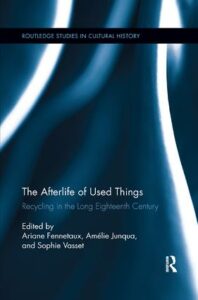
The Afterlife of Used Things
Recycling in the Long Eighteenth Century
Publication | Table des matières | Critiques
Résumé
Recycling is not a concept that is usually applied to the eighteenth century. “The environment” may not have existed as a notion then, yet practices of re-use and transformation obviously shaped the early-modern world. Still, this period of booming commerce and exchange was also marked by scarcity and want.
This book reveals the fascinating variety and ingenuity of recycling processes that may be observed in the commerce, crafts, literature, and medicine of the eighteenth century. Recycling is used as a thought-provoking means to revisit subjects such as consumption, the new science, or novel writing, and cast them in a new light where the waste of some becomes the luxury of others, clothes worn to rags are turned into paper and into books, and scientific breakthroughs are carried out in old kitchen pans.
- Ariane Fennetaux is Senior Lecturer in 18th-Century Studies at Université Paris Diderot.
- Amélie Junqua is a Senior Lecturer at the University of Amiens.
- Sophie Vasset is a Senior Lecturer at Université Paris Diderot.
Table des matières
- Introduction: The Many Lives of Recycling Ariane Fennetaux, Amélie Junqua and Sophie Vasset
- Part I: The Circulation of Goods
- 1. The Social Circulation of Luxury and Second-Hand Goods in Eighteenth-Century Parisian Shops Natacha Coquery
- 2. Luxury and Country House Sales in England, c.1760-1830 Jon Stobart
- 3. Recycling the Wreckage of History: On the Rise of an “Antiquarian Consumer Culture” in the Southern Netherlands Ilja Van Damme
- 4. Recycling Orientalia: William Beckford’s Æsthetics of Appropriation Laurent Châtel Part II: The Stewardship of Objects and the Material Practices of Recycling
- 5. Recycling the City: Paris, 1760s-1800 Allan Potofsky
- 6. Renewing and Refashioning: Recycling Furniture at the Late Stuart Court (1689-1714) Olivia Fryman
- 7. Invisible Mending?: Ceramic Repair in Eighteenth-Century England Sara Pennell
- 8. Sentimental Economics: Recycling Textiles in Eighteenth-Century Britain Ariane Fennetaux
- 9. Science and Recycling in the Long Eighteenth Century Simon Werrett
- 10. Recycling the Sacred: The Wax Votive Object and the Eighteenth-Century Wax Baby Doll Elizabeth Kowaleski Wallace Part III: Textual Recyclings
- 11. Inventive Mendicancy, Thrift and Extravagance Manifested in Re-Circulated Material in an Eighteenth-Century Library W. G. Day
- 12. Unstable Shades of Grey: Cloth and Paper in Addison’s Periodicals Amélie Junqua
- 13. Black Transactions: Waste and Abundance in Samuel Richardson’s Clarissa. Rebecca Barr
- 14. “Never Was a Thing Put to So Many Uses”: Transfer and Transformation in Laurence Sterne’s Fiction (1759-1768) Brigitte Friant-Kessler
- 15. Recycling a Medical Case: The Walpoles’ Stone and Gravel Sophie Vasset
Critiques
- “This important volume from an authoritative international team of authors sheds significant new light on the comparative development of post-war Conservatism in the western world.”
– Stuart Ball, Professor Emeritus, University of Leicester, UK - “The rich essays collected in this illuminating volume show that the rise of right-wing politics in the United Kingdom, the United States, and France since the 1970s was a remarkably transnational phenomenon. As they attacked social democracy and cultural pluralism, right-wing movements borrowed ideas, visions, vocabularies, and tactics from each other, adapting them to their own national idioms and using advances in one country to win advances elsewhere. Anyone interested in confronting the problems that have proliferated in the wake the right’s reconfiguration of politics – surging inequality, belligerent ethno-nationalism, worker disempowerment and insecurity, and lost faith in the capacity for democratic self-government – has much to learn about the origins of these problems from this important book.”
– Joseph A. McCartin, Georgetown University, USA, author of Collision Course
